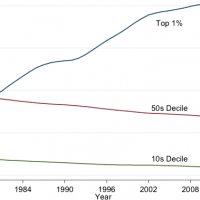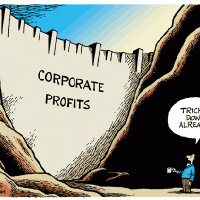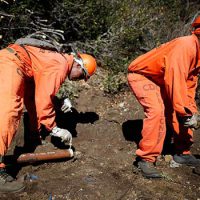-
Globalization and executive compensation
Growing inequality has been one of the most salient features of the US economy over the last 40 years. A variety of explanations for this rapid growth in top incomes have been proposed, including growing firm size new technology, the market for superstars, poor governance, and changes in top tax rates.
-
The thing about Trump’s infrastructure plan is: it doesn’t really exist
The Republican leaders of Congress killed off Trump’s much touted infrastructure plan months before he even reached the Oval Office. What we are left with is a farce.
-
New Perception of Imperialism
If accumulating wealth is the basic objective of capitalism, organising production using wage labour is only one of the ways it can be achieved. What finance does is to open an alternative route to reach the same objective, that is via transaction.
-
Trump nominates actual fascist David Clarke for Department of Homeland Security
Words like fascist and authoritarian get thrown around too promiscuously. But there is no other way to describe David Clarke, who today announced that he was named assistant secretary of the Department of Homeland Security. (The Department has not confirmed Clarke’s appointment.) Clarke occupies the extremist, anti-democratic fringe of far-right officials, even by the standards of the Trump administration.
-
Silicon Valley’s toys contribute to Iran’s 2017 presidential election
With a few days to go to Iran’s upcoming presidential elections on 19 May, six candidates could survive the vetting process of the Guardian Councils.… The role of the media, both in Iran and throughout the diaspora, to shape public opinion is significant. Iranian state media, radio and television are supposed to give the “hopefuls” an opportunity to continue campaigning for office, as they speak about their future plans and defend past performances, but they often fall short.
-
South Africa’s business community has not stepped up honestly
Prof Patrick Bond from the University of the Witswatersrand (Wits) tells Business Day TV why the World Economic Forum, which held its annual Africa meeting last week, serves the interests of the ruling elite at the expense of communities.
-
Road to Trump’s Climate Change Hell Paved by Obama and Clinton
Monthly Review Press author Gerald Horne, Robert Pollin and Paul Jay discuss the debate within the Trump White House on whether to leave the Paris climate accords or just undermine them; and how this relates to the fight within the Democratic Party.
-
Slandering Populism
Populism properly understood is about popular and democratic opposition to the rule of the money power—to the reign of concentrated wealth. It emerged from radical farmers’ fight for social and economic justice and democracy against the plutocracy of the nation’s Robber Baron capitalists during the late 19th century. It was a movement of the left.
-
What’s driving abnormal profit margins? Monopoly
Why is the cause of abnormally high corporate profit margins in the US. The phenomenon is amongst other things upsetting the standard notion that profits are mean reverting to historic averages. Jeremy Grantham (of the global investment management firm, GMO) puts the cause down to three other factors: increased monopoly power, increased political power and increased brand power.
-
The Return of Commercial Prison Labor
In the decades following, the number of prisoners decreased to a historic minimum. But with cutbacks in the welfare state, the prison population exploded from about 200,000 in 1975 to 2,300,000 in 2013 (Scherrer and Shah, 2017: 37) and prison labor for commercial purposes became legal again. Today, about 15% of the inmates in federal and state prisons perform work for companies such as Boeing, Starbucks and Victoria’s Secret. Migrants detained for violating immigration laws are one of the fastest growing segments of prison labor. Under the Trump administration, their numbers are most likely to increase.
-
Miracles Can Happen
To follow German politics these days you have to like arithmetic. At first only up to six, for that many parties are now vying to get good grades, lots of votes, and more power in the September elections to the Bundestag, which will lead to a government ruling until 2021.
-
Monopolization and labor exploitation
Those who advocate “freeing the market” claim that doing so will encourage competition and thereby increase majority well-being. These advocates have certainly had their way shaping economic policies. And the results? According to several leading economists, the results include the growing monopolization of product markets and the steady decline in labour’s share of national income. Neither outcome desirable.
-
Kendeng Against Cement
Since March 13, 2017, over 50 local indigenous peasants known as Sedulur Kendeng, from Central Java, Indonesia, have been sitting with their feet in cement boxes in protest before the Presidential Palace. This is their second such protest in eleven months.
-
What Do These Crusading Warmongers Say About Iran?
Russia’s strategic alliance with Iran is at the heart of global tensions, and the speed and ferocity of statements by the new U.S. administration do little to allay concerns.… The crusading language of the new US administration is alarming and is engineered to promote “Iranophobia.” Once again the narrative that the Islamic Republic is on the verge of producing nuclear weapons with which it will target Israel and set off an unprecedented Middle Eastern arms race, strives to dominate the public sphere.
-
Trump’s March of Folly
The Trump White House is neofascist in terms of its political base, its ideology, and the policies it is advocating. The rest of the U.S. state, the Congress, the judiciary… are not at present neofascist. So we are in a period which is analogous to what the Nazis called Gleichschaltung (bringing into line), which means a fight within the state.
-
Reading Marx’s Capital Today: Lessons from Latin America
One hundred and fifty years ago, Karl Marx published his book Capital, an intellectual effort of great breadth, with the aim of revealing the logic of capitalist production and providing workers with theoretical instruments for their liberation. Having discovered the logic of the system, he was able to foresee with great anticipation much of what is happening in the world capitalist economy today. But, we cannot mechanically apply what is outlined in Capital to the current reality of Latin America.
-
The Rift in the Metabolism of Nature and Society
The truth is that the environmental problems and the mounting catastrophes facing humanity have everything to do with economic and environmental injustice and a society that put the accumulation of capital before people and the planet. This is so much the case that we will increasingly see the development of an environmental proletariat where the working class broadly speaking, accounting for the greater part of humanity, will be increasingly drawn together by the need to respond to deteriorating material conditions in which the distinction between say the material conditions on the job and life conditions in general will more and more dissolve.
-
The Election of Donald Trump
1. The recent election of Donald Trump after Brexit, the rise of fascist votes in Europe, but also and much better, the electoral victory of SYRIZA and the rise of Podemos are all manifestations of the depth of the crisis of the system of globalized neoliberalism. This system, which I have always considered unsustainable, is imploding before our eyes at its very heart. All attempts to save the system — to avoid the worst — by minor adjustments are doomed to failure.
-
Migration as Revolt against Capital
The fact that a large number of refugees, especially from countries which have been subjected of late to the ravages of imperialist aggression and wars, are desperately trying to enter Europe is seen almost exclusively in humanitarian terms. While this perception no doubt has validity, there is another aspect of the issue which has escaped […]




















